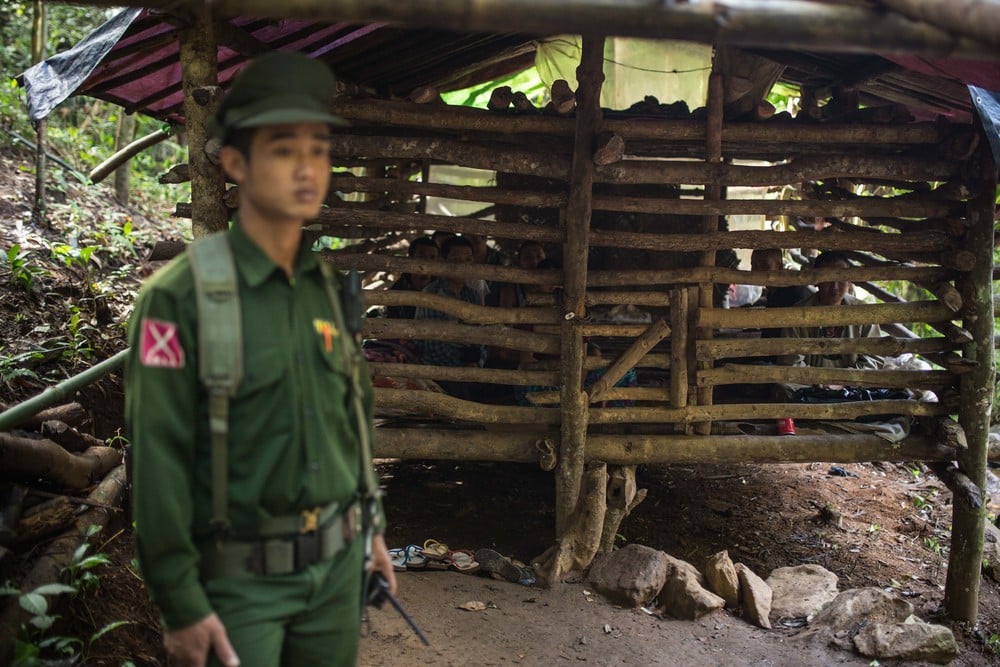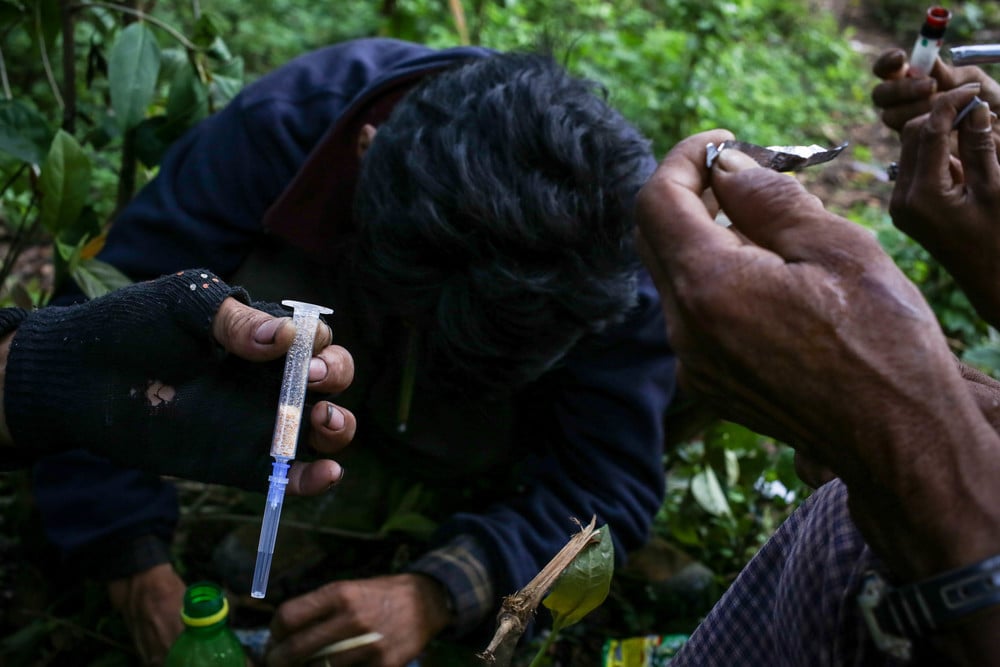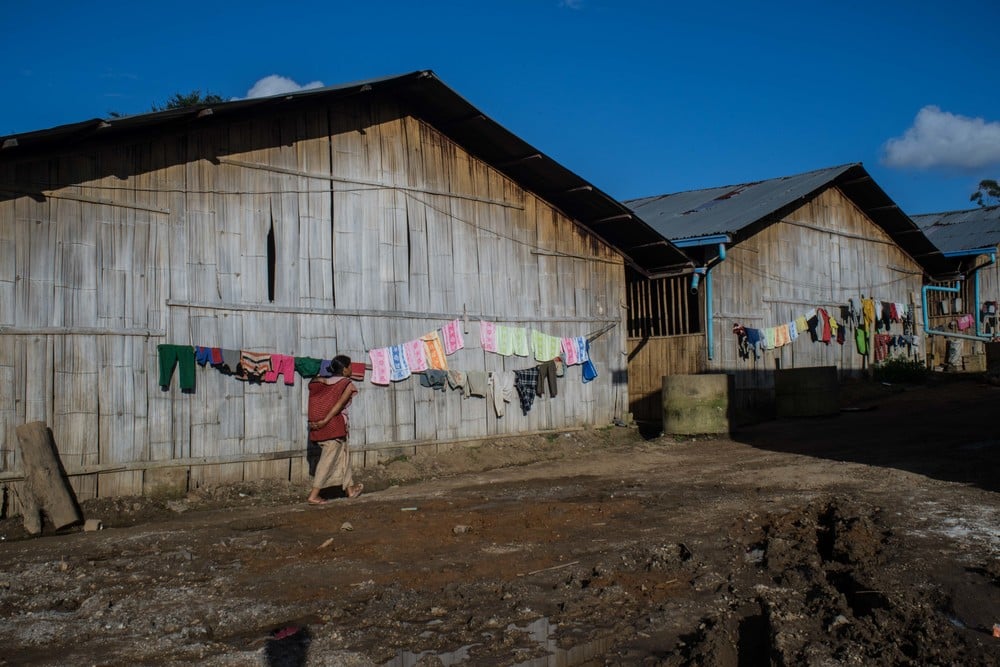The reasons behind Myanmar’s six decades of ethnic warfare are many and varied, but General “Robert” Ar Nyun can tell you in a word why his group began fighting the government four years ago: drugs.
Ar Nyun is a commander in the Ta’ang National Liberation Army, which is drawn from the ethnic Ta’ang minority. Also known as the Palaung, they live in a rugged swathe of land that stretches across northern Shan State to the Chinese border. The Ta’ang are famous tea farmers, but over the past decade a new crop began spreading through the green hills of their homeland: opium poppies.
Ar Nyun accuses pro-government militias led by members of Myanmar’s ruling party of pushing poppy cultivation and manufacturing its derivative, heroin, as well as amphetamine-type stimulants. He blames them also for the drug epidemic that has swept through Ta’ang communities, which he said has happened so rapidly that it has torn the social fabric apart and threatens their entire culture.
“We thought, if it kept going on, the Ta’ang would disappear in 10 years, so we had to take up arms to fight drugs,” said Ar Nyun on a recent morning after a breakfast of vegetable and mutton curry, and two small glasses of homemade rice wine.
The TNLA is just one of about two dozen ethnic armed groups operating in Myanmar, which has been riven by conflict since independence from Britain in 1948. Some groups have fought for a separate state, while others seek political autonomy within a federal system. The TNLA shares the political aims of several other groups, most of which also represent minorities that have been marginalised by the ethnic Bama-dominated government.
A Nationwide Ceasefire Agreement is meant to be the starting point for negotiations about creating a federal system that would resolve ethnic grievances. But the government refuses to allow the TNLA to participate because it is fighting alongside another insurgent group on the Chinese border in a conflict that broke out in early 2015 and has put a heavy strain on the military. The ceasefire agreement is a key plank in the reform programme initiated by the quasi-civilian government that took power in 2011 after 49 years of military rule. But only eight groups signed the accord, out of the 15 invited to do so.
The TNLA’s political objectives take a back seat to its primary mission, according to Ar Nyun. “The first enemy is the drugs, and the second is the government,” he said in an interview in Pahlaing, a remote village in northern Shan State.
Claims by an insurgent army that it is fighting to eliminate drugs may seem far-fetched, and perhaps even more so coming from a group operating in the “Golden Triangle”. That’s where the borders of Myanmar, Laos and Thailand converge in an area that became notorious in the late 1960s for heroin production, which has funded the rise of drug lords and powerful ethnic armies.
Yet, the TNLA appears to be genuine in its efforts to eradicate drugs. The group has busted dealers, and it has been destroying opium fields. Ar Nyun says that has brought them into armed confrontation with militias led by Kyaw Myint and Ti Khun Myat – MPs with the ruling Union Solidarity and Development Party – and Mahtu Naw, who commands the Kachin Defence Army (KDA), which broke away from the Kachin Independence Army, an ethnic armed group, to become a pro-government militia.

Tom Kramer of the Netherlands-based Transnational Institute said he has interviewed poppy farmers in TNLA areas who were unhappy that the group was destroying their crops. And he said many villagers in areas under Kyaw Myint’s control verified that his militia is involved in drug production.
Kramer said opium and heroin production also happens in areas under the control of militias commanded by Mahtu Naw and Ti Khun Myat. “Clearly, they have a lot of involvement in the drug trade,” he said.
POPPIES AND POLITICS
While farming poppies and producing heroin and amphetamine-type stimulants are illegal in Myanmar, it is clear to observers like Kramer that the government has given a “free hand” to its militia allies to fund themselves through drugs. And the nexus of drugs, militias and politics goes even deeper than that.
Ti Khun Myat, one of the ruling party MPs who is also a militia commander, is running for re-election to the national parliament in the 8 November elections.
The USDP is also running a KDA commander named Nan Shaung for Kachin Ethnic Affairs Minister, according to ruling party official Kyaw Myint (no relation to the militia leader) in Lashio, the largest city in northern Shan State. He said his namesake, the militia commander, is not standing for re-election in the Shan State Assembly this year, but his son, Min Tun Aung, will run in his place.
The militias are authorised under the military-drafted 2008 constitution. They are helpful to the military in its fight against ethnic insurgents because their ranks are drawn from local communities and they know the terrain and languages.
“As far as I know, it is impossible that the militia groups are protecting heroin production,” said Kyaw Myint, the USDP official who is a retired police commissioner, in an interview at party headquarters in Lashio. “They have contact with the military always. They are just helping the military operation.”
Research groups and local sources tell a different story. Groups including the Transnational Institute, the Kachin Women’s Association Thailand, Shan Drug Watch and the Palaung Women’s Organisation have documented the roles of militia-commanding politicians in the drug trade. Some have been fairly brazen about their involvement. During his 2010 election campaign, Kyaw Myint publicly promised opium poppy farmers that their fields would be protected.
ADDICTION IS A CRIME
In rainy season, Pahlaing is accessible only by a motorbike equipped with chains on its tires to negotiate the muddy track. The village of about 700 people sits on a ridge overlooking an emerald patchwork of peaks and hillsides dotted with tea bushes. From a two-story wooden house, with radios buzzing in the background, Ar Nyun commands his territory.
Ar Nyun’s sidekick, a young man with an easy grin who introduced himself as “A 1”, led a couple of soldiers with semi-automatic weapons through Pahlaing’s winding paths. They greeted women spreading out tea leaves to dry in the morning sunlight, and others heading out for the day to harvest fresh leaves in woven baskets suspended by a sling across their foreheads.
The soldiers turned off the main road out of town and descended a steep jungle path. At the bottom, next to a creek, was a crude structure on stilts with a tarpaulin roof, and walls made of logs that resembled the bars of a jail cell.
In addition to battling militias and government soldiers, the TNLA is waging a war against drug addiction in its own communities. But many may balk at the group’s methods. To the TNLA, addiction is not so much a disease as it is a crime.
Eight people were huddled in the TNLA’s prison in the creek bed. “Those are drug dealers and drug users as well,” explained Ar Nyun.
He said large-scale drug dealers are sent to the TNLA central committee to deal with, but if his officers capture small time dealers they are immediately sentenced, with no trial. They are imprisoned for three months on a first offence, and six months plus a fine of three times the value of the drugs they sold for a second offence. Drug dealers caught a third time are imprisoned for a year.
“For drug users, they are kept there until they can totally control themselves,” said Ar Nyun.

The TNLA’s approach to dealing with addiction is not much different from the government’s or other ethnic armed groups. But Kramer of the Transnational Institute said enforcing detox by locking people up does not work, and that relapse rates are between 80 and 90 percent.
“I can understand why it’s happening, because the problem is so big,” he said. “But it’s ineffectual and it violates human rights.”
The dealers are also interrogated about where they get supplies of heroin and amphetamine, and Ar Nyun said the trail inevitably leads to areas protected by the militias. “Every drug dealer says it’s the factories over there, and sometimes we seize small factories."
For the past few years, the TNLA has been roaming the mountains of northern Shan State and destroying poppy fields just before the harvest. This leads to clashes when they enter territory contested by militias, which then call for reinforcements from the military.
Kramer said a militia commander in Khutkai related an example of calling in military reinforcements to regain territory lost in battle with the KIA. He said the militias “serve a strategic interest” by operating in areas between territory controlled by ethnic armed groups and the military.
“They are like a buffer force,” he said.
DRUG EPIDEMIC
There is little official data on the sensitive issue of drug use in Myanmar, but the Transnational Institute said in its report last year that parts of Kachin and northern Shan states are facing a “heroin epidemic”. Other groups have carried out limited surveys in areas of northern Shan and Kachin states, which suggest that the use of heroin and amphetamine-type stimulants has risen dramatically in recent years.
The 2014 Southeast Asia Opium Survey by the United Nations Office on Drugs and Crime found the same trend. Myanmar is the world’s second largest opium producer after Afghanistan and most of it comes from Shan State, according to UNODC. Production has risen steadily after falling to a low in 2006, while drug use has also increased sharply. In areas surveyed by the UNODC, the use of opium increased by 83 percent over the previous year, while the use of an amphetamine-type stimulant known as “yaba” grew by 87 percent, and heroin use increased by 115 percent.
Lway Poe Ngeal of the Palaung Women’s Organisation said violent conflict has increased in northern Shan State, partly due to the emergence of the TNLA, and it’s become too dangerous to carry out the kind of field research they did a couple years ago to survey levels of drug addiction and production. But she said drugs still affect many people.
“It creates more violence inside families and communities,” said Lway Poe Ngeal in an interview in Lashio. “It is very hard for the Ta’ang people right now.”

CROSSROADS OF CONFLICT
Driving north from Lashio you climb a winding highway that straightens out on a pine-forested plateau and leads to Khutkai, which is the last township you can visit without needing special permission from the government. If you drove northwest, you would arrive in Namhkam Township, where Kyaw Myint represents the USDP in the state parliament and maintains his powerful militia.
Khutkai is at a crossroads of conflict. The military operates there as well as the TNLA and the KIA. Two of the militias fighting the TNLA are based in Khutkai: the KDA and the group controlled by Ti Khun Myat.
There have been frequent clashes over the past few years between various armed groups, and there are now half a dozen displacement camps inside the township capital and nearby. The most recent settlement is called Pansay camp, which houses an entire village of about 500 people who fled there in April this year after fighting intensified between the military, KIA, TNLA and militias, according to camp leader Sein Aung.
“We didn’t dare to stay there anymore, as sometimes mortar shells fell into our village during fighting,” he said.

Another camp about a half hour drive from the town centre houses people who came to escape fighting in 2012. Earlier in the day, a team from the USDP had stopped there to campaign. An elderly woman displayed flyers she’d been given, including one profiling Ti Khun Myat, although he had not personally visited the camp.
Ti Khun Myat’s whereabouts were a bit of a mystery.
Staff at the USDP office in the township capital said he was not available and there was no one else who could speak to reporters. Officials from the Khutkai and Lashio USDP offices who answered phone calls later on said they could not give out numbers for Ti Khun Myat, Nan Shaung or Min Tun Aung. “They will not give interviews or comments to media as they are busy,” said one official.
In contrast to the rather chilly reception at the Khutkai USDP office, Kyaw Myint, the amiable former policeman helping the campaign in Lashio, was happy to talk. He was unable to provide contacts for the three candidates, but gave assurances that any evidence of their involvement in the drug trade is false.
“They are working to eliminate drugs with nationalist spirit,” he said.

|

|





